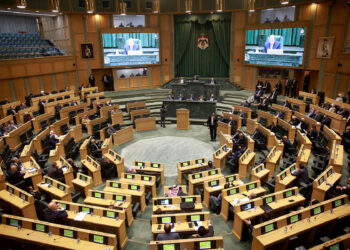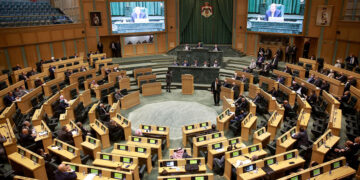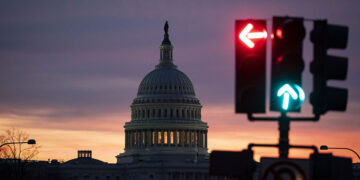U.S.: DC Lobbyist Representing Saudi Government Drops Contract After Pressure from DAWN
عربي
(Washington D.C., September 23, 2021) – Washington insider lobbyist Ed Newberry and his associates at Squire Patton Boggs (SPB) have dropped their contract with the Saudi government entity implicated in the gruesome murder of Saudi journalist and U.S. resident Jamal Khashoggi.
This comes two weeks after DAWN and several partner organizations including Freedom Forward and the Center for International Policy launched a campaign to demand that U.S. firms stop lobbying for abusive governments in the Middle East and North Africa and whitewashing their crimes and human rights violations. DAWN's Lobbyist Hall of Shame names these lobbyists and their firms and examines how their work enables these repressive regimes.
Ed Newberry is the first lobbyist featured in DAWN's Lobbyist Hall of Shame. Newberry works for the well-known Washington, D.C. firm Squire Patton Boggs (SPB). He had been registered as a foreign agent since 2016 for the Saudi Center for Studies and Media Affairs until he terminated his firm's Foreign Agent registration for the Center for Studies and Media Affairs at the Saudi Royal Court earlier this week.
"Newberry and SPG's decision to terminate its contract with an abusive Saudi agency is an important victory for organizations that do not want well-paid lobbyists to represent abusive governments and influence our elected officials," said Raed Jarrar, DAWN's Advocacy Director. "Every lobbyist working for the autocrats and abusers of the Middle East should end their contracts or expect to find themselves on our Lobbyist Hall of Shame."
The Saudi Center for Studies and Media Affairs was previously headed by Saud al-Qahtani, the Saudi official sanctioned by the U.S. government for his role in Khashoggi's murder. Newberry signed an engagement agreement with al-Qahtani in September 2016 for an annual fee of $1.2 million to advocate on behalf of the Center before U.S. government officials.
DAWN has the following set of recommendations for lobbyists, Congress, and State Bar Associations in the US:
To lobbyists:
- Client Due Diligence: Lobbyists should conduct a due diligence review examining the human rights and humanitarian law record of a government, government agency, or government official they seek to represent and determine the extent to which their representation would contribute to, or benefit from, any of their human rights or humanitarian law abuses, including by misrepresenting or omitting information to the public or U.S. government officials and representatives about their human rights record. It should also make such reviews public.
- Refuse to Work for Abusive Governments, Agencies or Officials: Lobbyists should pledge to decline representation of a foreign government, government agency, or government official where there is credible information implicating them in the commission of gross violations of human rights (GCHR) or international humanitarian law.
- Adopt and Pledge to Comply with the OECD Recommendations and the UN Guiding Principles: U.S. lobbyists should adopt the OECD Recommendations, including those aiming to enhance transparency, honesty, and accuracy in the information provided by lobbyists to government officials. U.S. lobbyists should also adopt the UN Guiding Principles.
- Assess Human Rights Impact of Lobbying Activities: Lobbyists should regularly assess their existing lobbying activities for foreign governments, agencies or officials to evaluate whether they contribute to or benefit from adverse human rights impacts, pursuant to the UN Guiding Principles. Where such contribution or benefit exists, lobbyists should take appropriate measures to address them, including, when necessary, by terminating an existing lobbying contract. This includes a responsibility to prevent or mitigate adverse human rights impacts that are directly linked to lobbying activities, even if the lobbyist has not contributed to those impacts.
To the U.S. Congress:
- Pass the "For the People Act of 2021" (H.R.1/S.1): Congress should pass the Act and implement its regulations, especially those pertaining to foreign governments that have committed GVHRs and the much needed reforms of the Foreign Agents Registration Act (FARA).
- Improve lobbying transparency regulations: Congress should integrate two separate sets of legal transparency requirements: the Lobbying Disclosure Act and the Foreign Agents Registration Act.
To US elected officials and their staff members:
- No Meetings with Abusive Government Lobbyists: Pledge to refrain from meeting with lobbyists working on behalf of governments, agencies or officials where there is credible information, documented by human rights organizations or by the State Department's Annual Human Rights Report, implicating them in gross violations of human rights or international humanitarian law.
- No Lobbying for Abusive Governments: After leaving office, pledge to refrain from lobbying on behalf of foreign governments, agencies or officials where there is credible information implicating them in GVHRs or serious violations of international humanitarian law.
To U.S. State Bar Associations:
- Disbar Unethical Lobbyists: Investigate and suspend from the practice of law any lawyer who communicates false and misleading statements, including material omissions, to lawmakers and the public at large in his/her capacity as a lobbyist.
The Lobbyist Hall of Shame will continue to feature lobbyists working on behalf of abusive and apartheid governments in the Middle East and North Africa.






































